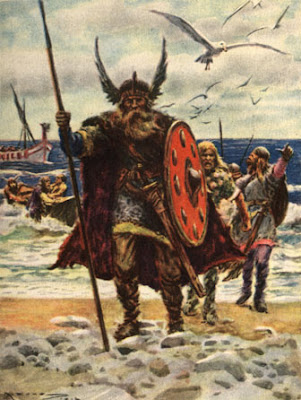It is the great north wind that made the Vikings. - Scandinavian proverb
Lately, The Vikings were considered big and strong, the cold and harsh north wind made them tough. They had to be tough to survive, so the weaker and smaller Vikings probably died off in natural selection. They also used the winds to sail and travel, explore, conquer, and pillage.
The path to success is full of stones and it is always under construction. A man gets stronger whenever his skin is pricked. He gets wiser when he face more troubles. In order to know how to swim, you must step into the cold water with no second thought.
You don’t have to be rude to be strong. You don’t have to avoid messing up to be strong. Taking the safe choice against the wall till you reach the shore is not the answer either. You cannot sit on the road to success for if you do, you will get run over. So as the Chinese say: Pray to God, but keep rowing to shore. Moreover, it is not a shame to begin with tiny step to accomplish a huge dream, “The man who removes a mountain begins by carrying away small stones - Chinese proverb”.
Being reckless is not the answer and hiding at home is not the answer. Just pave your own path to your goal after knowing exactly what you don't want in life. Have alternative plans to back up the main one. The only condition is to be cautious, thoughtful, comforted and never slow down or give up totally. Whether you like it or not, Life goes on even if you stood still and time will slip through your fingers.
This a brief about the Viking History
The source for the word Viking is disputed. Two suggested origins are the Old Norse word vik meaning bay or the Latin word for town, vicus, similar to the Germanic wik.
The term Viking is used to refer to the Norse(Scandinavian) explorers, warriors, merchants, and pirates who raided, traded, explored and settled in wide areas of Europe and the North Atlantic islands from the late 8th to the mid-11th century.
These Norsemen used their famed longships to travel as far east as Constantinople and the Volga River in Russia, and as far west as Iceland, Greenland, and Newfoundland, and as far south as Al Andalus. This period of Viking expansion, known as the Viking Age , forms a major part of the medieval history of Scandinavia, Britain, Ireland and the rest of Europe in general.
The Viking ageThe period from the earliest recorded raids in the 790s until the Norman Conquest of England in 1066 is commonly known as the Viking Age of Scandinavian history. It is assumed that raids to the people living around the Baltic Sea has an earlier history. They are however not well known, because of lack of written sources from that area. The Normans were descended from Danish and Norwegian Vikings who were given feudal over lordship of areas in northern France in the 10th century. Geographically, a Viking Age may be assigned not only to Scandinavian lands (modern Denmark, Norway and Sweden), but also to territories under North Germanic dominance.
You can find more detail in this area on wikipedia J


Comments
Post a Comment